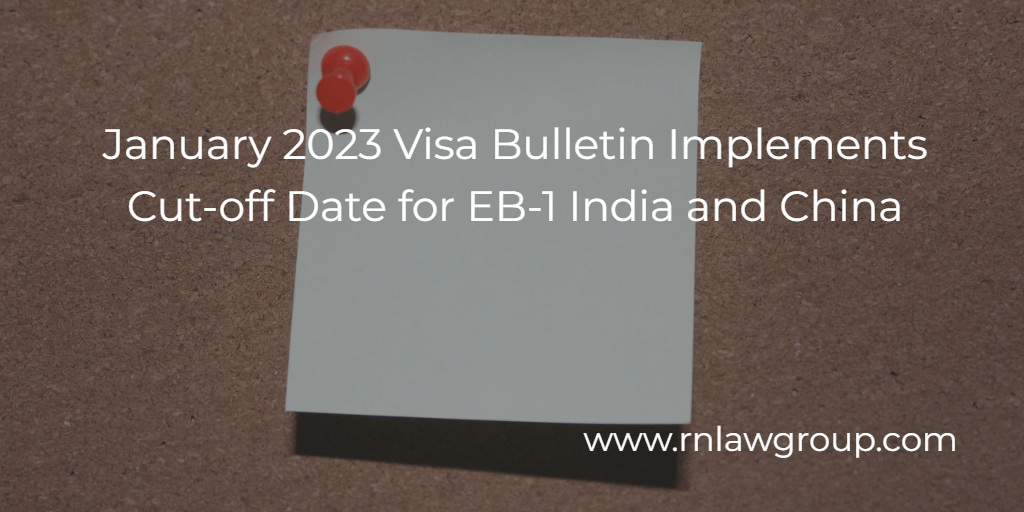
January 2023 Visa Bulletin Implements Cut-off Date for EB-1 India and China
What is the Visa Bulletin?
The Visa Bulletin is a monthly publication issued by the U.S. Department of State’s Bureau of Consular Affairs that provides information on the availability of immigrant visas for individuals seeking to immigrate to the United States. It is used by individuals who are seeking to apply for a green card, which is a document that allows a foreign national to live and work in the United States permanently.
The Visa Bulletin is organized by categories, which are based on the individual’s relationship to a U.S. citizen or lawful permanent resident for family-based categories, or the individual’s employment situation in the employment-based categories. Each category has a priority date, which is the date that the individual’s process for a green card was begun.
Why is the Visa Bulletin Important?
The purpose of the Visa Bulletin is to manage the demand for immigrant visas and to ensure that individuals who are eligible for a green card are able to obtain one in a timely manner. It helps to ensure that the process of obtaining a green card is fair and orderly, and that individuals who meet the requirements for a green card are able to immigrate to the United States or adjust status within the country. The Visa Bulletin lists the current priority dates for each category, and individuals whose priority date is before the listed date are eligible to apply for a green card. Notably, in the recently issued January 2023 Visa Bulletin, the current priority date for the EB-1 category for India and China has moved backwards and now stands at February 1, 2022 in the Final Action Date chart.
Who Qualifies for the EB-1 Category?
The EB-1 green card category is a classification for immigrants who are considered to have “extraordinary ability” in their field of work or who are outstanding professors or researchers. It is part of the employment-based preference category of green cards, which means that it is for individuals who are coming to the United States to work in their field of expertise. EB-1 is also available for those working for multinational companies in managerial or executive capacities.
To be eligible for an EB-1 green card, an individual must be able to demonstrate that they have a high level of achievement in their field, such as through awards, publications, or membership in professional organizations. Alternatively, they may be able to qualify if they are an outstanding professor or researcher who has made significant contributions to their field and has been recognized internationally. Lastly, they may qualify if they have worked outside the United States for at least one year as a manager or executive and a U.S. employer with a qualifying relationship to the employer abroad is offering a position as a manager or executive.
In most EB green card categories, an individual must first secure a job offer from a U.S. employer. The employer must then file a petition on the individual’s behalf with the U.S. Citizenship and Immigration Services (USCIS). If the petition is approved, the individual can then apply for a green card either through consular processing (if they are outside the United States) or through adjustment of status (if they are already in the United States). Those applying in the extraordinary ability category do not require a job offer from a U.S. employer.
It is important to note that the EB-1 green card category is subject to annual caps, which means that there is a limited number of visas available each year. Because fewer people tend to qualify for the EB-1 category, the limited number of visas has not historically restricted the ability of immigrants to receive green cards in this category. The category is normally designated as “current” meaning all applicants in the category may file, regardless of priority date.
Why Did the EB-1 India and China Cut-Off Date Move Backwards?
There is an additional restriction on the number of visas that can be issued to immigrants from any single country in a given year, commonly referred to as the 7% per-country limit in employment-based immigrant visas. The 7% limit applies to the total number of visas that can be issued in the employment-based categories, which are divided into five preference categories based on the type of work the immigrant will be doing in the United States. Within each preference category, there is a separate 7% per-country limit for each country. This means that no single country can receive more than 7% of the visas available in any preference category in a given year.
The per-country limit is touted as ensuring that the employment-based immigration system is fair and balanced, and that immigrants from all countries have an equal opportunity to access employment-based visas. At the same time, it has created exceptionally long wait times for immigrants from India and China in the EB-2 and EB-3 categories. As a result of these longer wait times for EB-2 and EB-3 green cards for those from India and China, more immigrants are seeking green cards in the EB-1 category. Immigrants from other countries are also filing at a higher rate in the EB-1 category as the US wishes to attract global talent in the fields of science, technology, engineering, and math (STEM) and a job offer is not required for those with Extraordinary Ability. This higher demand for the EB-1 category worldwide has triggered the 7% limit to apply to India and China, thus reducing the number of green cards that can be issued to immigrants from those countries and essentially creating a waiting list. Beginning in January 2023, only those from India or China who filed EB-1 petitions before February 1, 2022 are eligible to receive green cards in this category.
By: Emily Neumann
Emily Neumann is Managing Partner at Reddy Neumann Brown PC with over 15 years of experience practicing US immigration law providing services to U.S. businesses and multinational corporations. Emily has helped transform the firm from a solo practice to Houston’s largest immigration law firm focused exclusively on U.S. employment-based immigration. She received her Bachelor’s degree in Biology from Central Michigan University and her Juris Doctorate degree from the University of Houston Law Center. Emily has been quoted in Bloomberg Law, U.S. News & World Report, Inside Higher Ed, and The Times of India on various hot topics in immigration. She is a member of the American Immigration Lawyers Association and Society for Human Resource Management.
In today’s global economy, being able to navigate the immigration process is critical to your business success. If you are interested in permanent residency or the EB-1 category, speak with one of our immigration lawyers. Please contact us online, call our Houston business immigration attorney office directly at 713-953-7787, or schedule a consultation.

